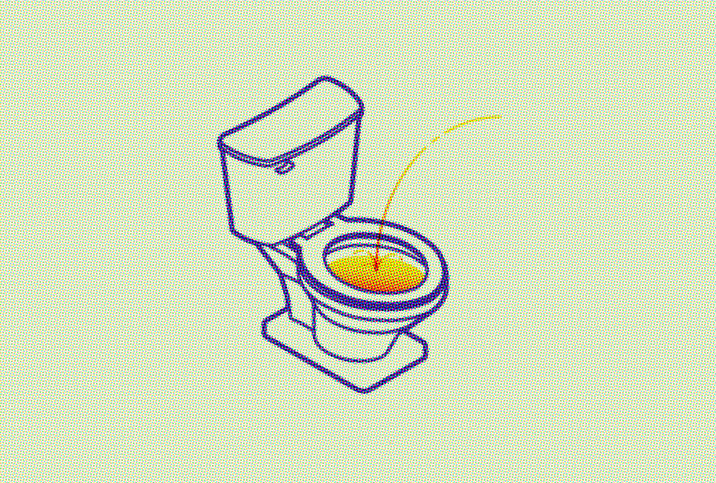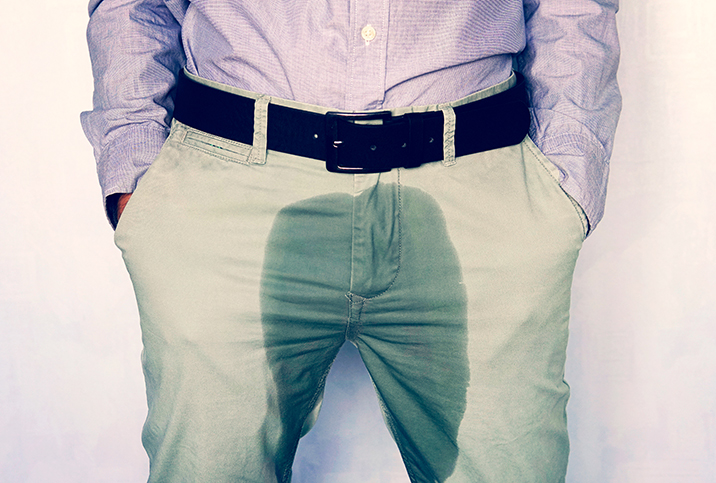Urinary Issues That Should Send You to the Doctor

Have you seen blood in your urine? Are you waking up in the middle of the night to visit the porcelain throne? Does it take a while for your urine stream to get going? Does it stop and start?
No, this isn't a bad infomercial. (Is there any other kind?)
These are urinary issues that should send you to a urologist, a doctor who specializes in the treatment of urinary system disorders.
Most urinary problems experienced by men, particularly in their 50s and older, are related to the enlargement of the prostate, a walnut-sized gland located between the bladder and the penis. Age-related prostate gland enlargement is called benign prostatic hyperplasia (BPH).
The urethra, the tube that conveys urine out of the body, runs through the center of the prostate. Picture a straw going through an orange. As the orange gets bigger, it can push in on the straw and make it narrower. That's the picture Josip Vukina, M.D., paints for his patients.
"As men get older, it's common to start to get some blockage of that flow," said the assistant professor of urology at the University of Pittsburgh School of Medicine.
Blockages can lead to a variety of urinary issues, including low stream, a sense of urgency and frequent sensations to go at night, according to Andrew Cohen, M.D., director of trauma and reconstructive urologic surgery at Johns Hopkins Bayview Medical Center in Baltimore.
"Different people have different constellations of symptoms," he said.
Younger men usually experience different urinary problems, Vukina said. In general, younger men do not have prostate obstruction problems, even if they come in with similar symptoms to those of an older patient.
"It's actually a lot of pelvic floor dysfunction, and that ties in to chronic pelvic pain," Vukina said. "A lot of those guys get treated inappropriately with antibiotics and are thought to have infections, but...sometimes the pelvic floor muscles and bladder are a little bit out of sync."
Blood, retention and other issues
Both Vukina and Cohen said that if you detect blood in your urine, you should definitely see a doctor.
"In younger folks, you think about an STD [sexually transmitted disease] or a urinary tract infection," Vukina said. "In older patients, you worry more about cancers of the urinary system, like bladder cancer and kidney cancer."
Blood in the urine, known as hematuria, rarely represents a serious health concern, according to Cohen, but it still needs to be checked by a medical professional. It could represent a kidney stone, BPH or some other problem, and doctors want to know which condition it is.
"We don't want to miss anything," Cohen said. "Depending on a patient's risk factors, they may need to have a telescope put into the bladder so we can see what's going on in there, in addition to a picture of their kidneys either with an ultrasound or a CT scan."
Another potential problem is urethral stricture disease, which occurs when scar tissue forms within the urethra. Cohen compares it to squeezing a backyard hose and causing the stream to go off in odd directions.
In addition to urine stream spraying, other signs of urethral stricture disease include bloody or dark urine, decreased urine stream and urine leakage.
"If you can't pee at all, which is called urinary retention, that's a major red flag," Vukina said. "You should either go to the emergency room or see a doctor right away. Other than that, none of this stuff is necessarily that pressing."
How are urinary problems diagnosed?
Any good evaluation of a urinary problem typically begins with a urine test to look at what's in it and to make sure there's no infection, Cohen said.
Patients will often fill out a questionnaire about how they urinate.
"There are validated, patient-reported quality outcome metrics that we use to compare to each other and compare men over time in terms of the quality of their urination," Cohen said.
Noninvasive tests, such as ultrasounds, may be used, Cohen said. For example, if a man thinks he's not completely emptying his bladder, an ultrasound can determine whether he is emptying his bladder thoroughly. If a man has a serious issue, more invasive testing is needed to get to the bottom of the problem.
How are urinary problems treated?
Men who have BPH have access to an array of treatment options. Medications known as alpha blockers are often used, Cohen said. Common brands include Flomax and Rapaflo.
"Those medicines essentially help to relax the outlet a little bit so that the stream is improved," Cohen said. "They've been shown in clinical trials to help improve the quality of urination and quality of life for men who have BPH."
For men with more severe symptoms, surgical procedures can either reduce the size or change the shape of the prostate so urination can be improved. These procedures are common because BPH is common, and are safe, effective and popular, Cohen said.
Younger men who have pelvic floor dysfunction can benefit from pelvic floor physiotherapy that retrains those muscles, Vukina said. This is a better option than antibiotic therapies because younger men rarely have a prostate obstruction.
Follow-up care
At the start of treatment for a urinary problem, a urologist will want to develop a relationship with the patient and make sure the chosen treatment has improved their condition, Cohen said.
"If people are continuing to have symptoms and they're not getting better, we see them more often," he said. "Generally, we see people on a yearly basis."
Cohen added that urinary symptoms may change with time. He said it's relatively common for a man to start a particular medicine and do well for a few years before symptoms worsen.
"We may want to add another medicine, then they do well for a few years, and we add another medicine, but then symptoms get worse, and then they want to have surgery done," Cohen said.
Treating urinary problems sooner rather than later may help you avoid surgery. Don't hesitate to visit a urologist if you see blood in your urine or you experience difficulty with streaming, frequent urination, an urgency to urinate or urinary retention. Most urinary issues are easily treatable, and a urologist can help you choose an option that's best for your condition.


















